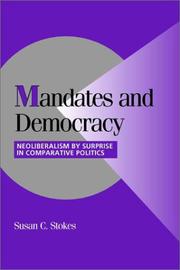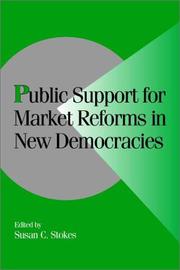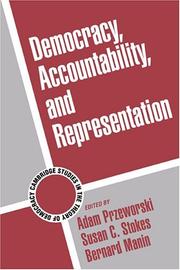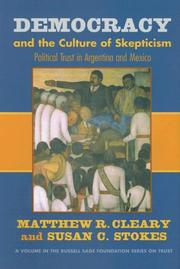| Listing 1 - 9 of 9 |
Sort by
|

ISBN: 0521805112 0521801184 0511174853 0511041438 0511154941 0511302444 0511612974 1280430389 0511047576 1107122627 9780511041433 9780521801188 9780521805117 9780511612978 9780511047572 9786610430383 6610430381 9781107122628 9781280430381 9780511174858 9780511154942 9780511302442 Year: 2001 Publisher: Cambridge Cambridge university press
Abstract | Keywords | Export | Availability | Bookmark
 Loading...
Loading...Choose an application
- Reference Manager
- EndNote
- RefWorks (Direct export to RefWorks)
Sometimes politicians run for office promising one set of policies, and if they win, switch to very different ones. Latin American presidents in recent years have frequently run promising to avoid pro-market reforms and harsh economic adjustment, then win and transform immediately into enthusiastic market reformers. Does it matter when politicians ignore the promises they made and the preferences of their constituents? If politicians want to be reelected or see their party reelected at the end of their term, why would they impose unpopular policies? Susan Stokes develops a model of policy switches and tests it with statistical and qualitative data from Latin American elections over the last two decades. She concludes that politicians may change policies because unpopular policies are best for constituents and best serve their own political ambitions. Nevertheless, even though good representatives sometimes switch policies, abrupt change tends to erode the quality of democracy.
Political systems --- Latin America --- Democracy --- Démocratie --- Amérique latine --- Politics and government --- Economic conditions --- Economic policy. --- Politique et gouvernement --- Conditions économiques --- Politique économique --- -Self-government --- Political science --- Equality --- Representative government and representation --- Republics --- Asociación Latinoamericana de Libre Comercio countries --- Neotropical region --- Neotropics --- New World tropics --- Spanish America --- -Economic conditions --- -Economic policy. --- Democracy. --- Latin America - Economic conditions - 1982-. --- Government - Non-U.S. --- Law, Politics & Government --- Government - Central & South America --- Social Sciences --- Political Science --- -Latin America --- Démocratie --- Amérique latine --- Conditions économiques --- Politique économique
Book
ISBN: 9781107660397 9781107042209 9781107324909 1107660394 Year: 2013 Publisher: Cambridge Cambridge University Press
Abstract | Keywords | Export | Availability | Bookmark
 Loading...
Loading...Choose an application
- Reference Manager
- EndNote
- RefWorks (Direct export to RefWorks)
Brokers, Voters and Clientelism addresses major questions in distributive politics. Why is it acceptable for parties to try to win elections by promising to make certain groups of people better off, but unacceptable, and illegal, to pay people for their votes? Why do parties often lavish benefits on loyal voters, whose support they can count on anyway, rather than on responsive swing voters? Why is vote buying and machine politics common in today's developing democracies but a thing of the past in most of today's advanced democracies? This book develops a theory of broker-mediated distribution to answer these questions, testing the theory with research from four developing democracies, and reviews a rich secondary literature on countries in all world regions. The authors deploy normative theory to evaluate whether clientelism, pork-barrel politics, and other non-programmatic distributive strategies can be justified on the grounds that they promote efficiency, redistribution, or voter participation
BPB1508 --- Moralité de la vie politique --- Politieke moraal --- moralidad de la clase política --- moralità politika --- moralność polityczna --- politická morálka --- moralità della vita politica --- politiskā ētika --- политически морал --- poliittinen moraali --- moralidade da vida política --- politieke moraal --- политички морал --- politikai morál --- morală politică --- politische Moral --- politična morala --- political morality --- moral politik --- poliitiline moraal --- politički moral --- politisk moral --- politinė moralė --- ηθική της πολιτικής ζωής --- politikai botrány --- политичка афера --- политичка етика --- politički skandal --- politisk skandal --- financiación ilegal de los partidos --- escândalo político --- poliitiline skandaal --- πολιτικό ήθος --- etică politică --- politinė etika --- comisiones ilegales --- политички интегритет --- politická etika --- scandale politique --- politisk skandale --- politikai etika --- politisks skandāls --- political scandal --- escándalo político --- politinis skandalas --- πολιτικό σκάνδαλο --- skandal politik --- политички скандал --- scandalo politico --- political ethics --- politický skandál --- Politskandal --- politikai erkölcs --- poliittinen skandaali --- political morals --- politická bezúhonnost --- politischer Skandal --- politička etika --- politiek schandaal --- etikë politike --- politiskā morāle --- ética política --- moral politike --- politikos moralumas --- moráltacht pholaitiúil --- Moralité de la vie politique

ISBN: 0520916239 0585129614 9780520916234 9780585129617 9780520200234 0520200233 0520086171 0520200233 Year: 1995 Publisher: Berkeley University of California Press
Abstract | Keywords | Export | Availability | Bookmark
 Loading...
Loading...Choose an application
- Reference Manager
- EndNote
- RefWorks (Direct export to RefWorks)
"Ethnography by a political scientist focuses on how urban poor have changed their perceptions of the State, citizenship, class and gender relations, and democracy and have movilized radical social movements. Analysis includes historical and ethnographic components"--Handbook of Latin American Studies, v. 57.
Social movements --- Urban poor --- Social conflict --- Sociology & Social History --- Social Sciences --- Social Conditions --- Class conflict --- Class struggle --- Conflict, Social --- Social tensions --- Interpersonal conflict --- Social psychology --- Sociology --- City dwellers --- Poor --- Movements, Social --- Social history --- Political activity. --- Political activity --- Peru --- Politics and government --- Conflits sociaux --- Mouvements sociaux --- Pauvres en milieu urbain --- Activité politique --- Pérou --- Politique et gouvernement --- Social movements. --- Urban poor. --- 20th century peruvian history. --- civilian rule. --- class consciousness. --- class difference. --- clientelism. --- contemporary peru. --- deference. --- ethnography. --- hegemony. --- ideology. --- independent. --- latin american history. --- lower class politics. --- mass public. --- nation state. --- oligarchy. --- oppressed classes. --- oppression. --- participant observation. --- peru. --- peruvian history. --- political culture. --- politics. --- poor people. --- popular culture. --- poverty. --- radical political thought. --- radical politics. --- shantytown. --- social activists. --- social movements. --- state. --- urban poor.

ISBN: 1139175238 0521663393 0521663415 Year: 2001 Publisher: Cambridge : Cambridge University Press,
Abstract | Keywords | Export | Availability | Bookmark
 Loading...
Loading...Choose an application
- Reference Manager
- EndNote
- RefWorks (Direct export to RefWorks)
Do people in new democracies undergoing market reforms turn against these reforms when the economic adjustment is painful? The conventional wisdom is that they will. According to 'economic voting' models, citizens punish elected governments for bad economic performance. The contributors to this collection, in contrast, begin with the insight that citizens in new democracies have good reasons to depart from the predictions of economic voting. If they believe the prediction that, with the transition to a market economy, economic conditions must deteriorate before they improve, they may interpret short-term deterioration as signaling that the transition is on course and things will improve in the future. If they perceive that forces from the past are responsible for economic deterioration, they may exonerate the government. With similar data-sets from three new democracies in Europe and three in Latin America, the authors probe the support for governments and economic reforms under economic conditions.
Economic policy --- New democracies --- Countries, Newly democratic --- Democracies, New --- Democratic states, New --- Emerging democracies --- Nations, Newly democratic --- New democratic states --- Newly democratic states --- States, Newly democratic --- Democracy --- Democratization --- Newly independent states --- Economic nationalism --- Economic planning --- National planning --- State planning --- Economics --- Planning --- National security --- Social policy --- Citizen participation --- Latin America --- Germany --- Poland --- Spain --- Espagne --- Espainiako Erresuma --- España --- Espanha --- Espanja --- Espanya --- Estado Español --- Hispania --- Hiszpania --- Isupania --- Kingdom of Spain --- Regne d'Espanya --- Reiaume d'Espanha --- Reino de España --- Reino d'Espanya --- Reinu d'España --- Sefarad --- Sepharad --- Shpanie --- Shpanye --- Spanien --- Spanish State --- Supein --- イスパニア --- スペイン --- Poyln --- Polska Rzeczpospolita Ludowa --- Polʹsha --- P.N.R. --- P.R.L. --- Pologne --- Polish Commonwealth --- Polonia --- Warsaw (Duchy) --- Polska --- Polsko --- T︠S︡arstvo Polʹskoe --- Królestwo Polskie --- Polʹskai︠a︡ Narodnai︠a︡ Respublika --- PNR --- PRL --- Poljska --- Lehastan --- Polin --- Būlūniyā --- Polonyah --- République populaire de Pologne --- Polen --- Ppolsŭkka --- Polish People's Republic --- Republic of Poland --- Poland (Territory under German occupation, 1939-1945) --- Generalgouvernement (Poland) --- Generalne Gubernatorstwo (Poland) --- General Government (Poland) --- Heneralʹna hubernii︠a︡ (Poland) --- Rzeczpospolita Polska --- Polish Republic --- Congress Kingdom of Poland --- Congress Poland --- Królestwo Kongresowe Polskie --- Kongresówka --- Kingdom of Poland --- Lahistān --- لهستان --- Polandia --- Полшэ --- Polshė --- Pole --- Republiek van Pole --- Republik Pole --- Polaland --- Polisce Cynewise --- Полша --- Полониа --- بولندا --- Būlandā --- Polóña --- Tavakuairetã Polóña --- Польша --- Puluña --- Ripublika Puluña --- Polşa --- Polşa Respublikası --- Pulandia --- Ripublik Pulandia --- Pho-lân --- Pho-lân Kiōng-hô-kok --- Польшча --- Polʹshcha --- Рэспубліка Польшча --- Rėspublika Polʹshcha --- Polonya --- Република Полша --- Republika Polsha --- Poin --- Republika Poljska --- Польшо --- Polʹsho --- Bu̇gėdė Naĭramdakha Polʹsho Ulas --- Polská republika --- Polaki --- Gwlad Pwyl --- Gweriniaeth Gwlad Pwyl --- Republikken Polen --- Republik Polen --- Poola --- Poola Vabariik --- Πολωνία --- Pulógna --- Польша Мастор --- Polʹsha Mastor --- República de Polonia --- Pollando --- Respubliko Pollando --- Repúbrica de Poloña --- Poloniako Errepublika --- Pólland --- République de Pologne --- Poalen --- Poloonya --- Polonie --- An Pholainn --- Pholainn --- Poblacht na Polainne --- Yn Pholynn --- Pholynn --- Pobblaght ny Polynn --- A' Phòlainn --- Poblachd na Pòlainn --- Borandi --- Pô-làn --- Польшин Орн --- Polʹshin Orn --- 폴란드 --- P'ollandŭ --- Pōlani --- Polish-Lithuanian Commonwealth --- Crown of the Kingdom of Poland and the Grand Duchy of Lithuania --- Commonwealth of Poland --- Lehastani Hanrapetutʻyun --- Польшæ --- Polʹshæ --- Польшæйы Республикæ --- Polʹshæĭy Respublikæ --- IPoland --- IPolandi --- Lýðveldið Pólland --- Repubblica di Polonia --- פולין --- רפובליקת פולין --- Republiḳat Polin --- Poleni --- Kunngiitsuuffik Poleni --- Pòlskô Repùblika --- Poloni --- Polonye --- Polòy --- Puoleja --- Puolejis Republika --- Polija --- Polijas Republika --- Lenkija --- Lenkijos Respublika --- Polsca --- Republica de Polsca --- Pol'šu --- Polskas --- Bupoolo --- Bupolska --- Ripablik kya Bupoolo --- Lengyelország --- Lengyel Köztársaság --- Lithuania (Grand Duchy) --- Alemania --- Ashkenaz --- BRD --- Bu̇gd Naĭramdakh German Uls --- Bundesrepublik Deutschland --- Deutsches Reich --- Deutschland --- Doitsu --- Doitsu Renpō Kyōwakoku --- Federal Republic of Germany --- Federalʹna Respublika Nimechchyny --- FRN --- German Uls --- Germania --- Germanii︠a︡ --- Germanyah --- Gjermani --- Grossdeutsches Reich --- Jirmānīya --- KhBNGU --- Kholboony Bu̇gd Naĭramdakh German Uls --- Nimechchyna --- Repoblika Federalin'i Alemana --- República de Alemania --- República Federal de Alemania --- Republika Federal Alemmana --- Vācijā --- Veĭmarskai︠a︡ Respublika --- Weimar Republic --- Weimarer Republik --- ХБНГУ --- Германия --- جرمانيا --- ドイツ --- ドイツ連邦共和国 --- ドイツ レンポウ キョウワコク --- Germany (East) --- Germany (Territory under Allied occupation, 1945-1955) --- Germany (Territory under Allied occupation, 1945-1955 : British Zone) --- Germany (Territory under Allied occupation, 1945-1955 : French Zone) --- Germany (Territory under Allied occupation, 1945-1955 : Russian Zone) --- Germany (Territory under Allied occupation, 1945-1955 : U.S. Zone) --- Germany (West) --- Holy Roman Empire --- Asociación Latinoamericana de Libre Comercio countries --- Neotropical region --- Neotropics --- New World tropics --- Spanish America --- Citizen participation. --- General Government for Occupied Polish Territories --- Deguo --- 德国 --- Gėrman --- Герман Улс --- Social Sciences --- Political Science
Book
ISBN: 1107440920 1316143333 1107324904 1107042208 1107660394 Year: 2013 Publisher: Cambridge : Cambridge University Press,
Abstract | Keywords | Export | Availability | Bookmark
 Loading...
Loading...Choose an application
- Reference Manager
- EndNote
- RefWorks (Direct export to RefWorks)
Brokers, Voters, and Clientelism addresses major questions in distributive politics. Why is it acceptable for parties to try to win elections by promising to make certain groups of people better off, but unacceptable - and illegal - to pay people for their votes? Why do parties often lavish benefits on loyal voters, whose support they can count on anyway, rather than on responsive swing voters? Why is vote buying and machine politics common in today's developing democracies but a thing of the past in most of today's advanced democracies? This book develops a theory of broker-mediated distribution to answer these questions, testing the theory with research from four developing democracies, and reviews a rich secondary literature on countries in all world regions. The authors deploy normative theory to evaluate whether clientelism, pork-barrel politics, and other non-programmatic distributive strategies can be justified on the grounds that they promote efficiency, redistribution, or voter participation.
Political planning --- Politics, Practical --- Political science --- Finance, Public --- Economic policy. --- Political ethics. --- Ethics, Political --- Ethics in government --- Government ethics --- Ethics --- Civics --- Economic nationalism --- Economic planning --- National planning --- State planning --- Economics --- Planning --- National security --- Social policy --- Cameralistics --- Public finance --- Public finances --- Currency question --- Electoral politics --- Mass political behavior --- Political behavior --- Politics --- Practical politics --- Political participation --- Planning in politics --- Public policy --- Policy sciences --- Public administration --- Economic aspects. --- Political aspects. --- Moral and ethical aspects

ISBN: 9781139175234 9780521663397 9780521663410 Year: 2001 Publisher: Cambridge Cambridge University Press
Abstract | Keywords | Export | Availability | Bookmark
 Loading...
Loading...Choose an application
- Reference Manager
- EndNote
- RefWorks (Direct export to RefWorks)
Book
ISBN: 9780191577482 Year: 2009 Publisher: Oxford Oxford University Press
Abstract | Keywords | Export | Availability | Bookmark
 Loading...
Loading...Choose an application
- Reference Manager
- EndNote
- RefWorks (Direct export to RefWorks)

ISBN: 0521646162 0521641535 1139175106 9780521641531 9780521646161 9781139175104 Year: 1999 Volume: *1 Publisher: Cambridge : Cambridge University Press,
Abstract | Keywords | Export | Availability | Bookmark
 Loading...
Loading...Choose an application
- Reference Manager
- EndNote
- RefWorks (Direct export to RefWorks)
This book examines whether the mechanisms of accountability characteristic of democratic systems are sufficient to induce the representatives to act in the best interest of the represented. The first part of the volume focuses on the role of elections, distinguishing different ways in which they may cause representation. The second part is devoted to the role of checks and balances, between the government and the parliament as well as between the government and the bureaucracy. The contributors of this volume, all leading scholars in the fields of American and comparative politics and political theory, address questions such as, whether elections induce governments to act in the interest of citizens. Are politicians in democracies accountable to voters in future elections? If so, does accountability induce politicians to represent citizens? Does accountability limit or enhance the scope of action of governments? Are governments that violate campaign mandates representative? Overall, the essays combine theoretical discussions, game-theoretic models, case studies, and statistical analyses, within a shared analytical approach and a standardized terminology. The empirical material is drawn from the well established democracies as well as from new democracies.
Government --- Political systems --- Political sociology --- Accountability --- Democracy --- Democratie --- Démocratie --- Elections --- Gouvernement représentatif --- Inspraak in het beleid --- Moral responsibility --- Obligation --- Overlegcultuur --- Parlementarisme --- Parliamentary government --- Political representation --- Representation --- Representative government and representation --- Responsabilité --- Responsibility --- Self-government --- Verantwoordelijkheid --- Verkiezingen --- Volksvertegenwoordiging --- #SBIB:324H20 --- #SBIB:324H40 --- #SBIB:003.IO --- Politologie: theorieën (democratie, comparatieve studieën….) --- Politieke structuren: algemeen --- Democracy. --- Elections. --- Representative government and representation. --- Responsibility. --- Obligation morale --- Responsabilité (Morale) --- Responsabilité (Philosophie) --- Responsabilité -- Aspect moral --- Responsabilité -- Philosophie --- Responsabilité morale --- Electoral politics --- Franchise --- Polls --- Political science --- Politics, Practical --- Plebiscite --- Political campaigns --- Equality --- Republics --- Ethics --- Supererogation --- Constitutional history --- Constitutional law --- Suffrage --- Criminal liability. --- Social Sciences --- Political Science

ISBN: 0871541661 9780871541666 Year: 2006 Publisher: New York : Russell Sage Foundation,
Abstract | Keywords | Export | Availability | Bookmark
 Loading...
Loading...Choose an application
- Reference Manager
- EndNote
- RefWorks (Direct export to RefWorks)
Democratization --- Democratization --- Trust --- Trust --- Political culture --- Political culture --- Public opinion --- Public opinion --- Démocratisation --- Démocratisation --- Confiance --- Confiance --- Culture politique --- Culture politique --- Opinion publique --- Opinion publique
| Listing 1 - 9 of 9 |
Sort by
|

 Search
Search Feedback
Feedback About UniCat
About UniCat  Help
Help News
News